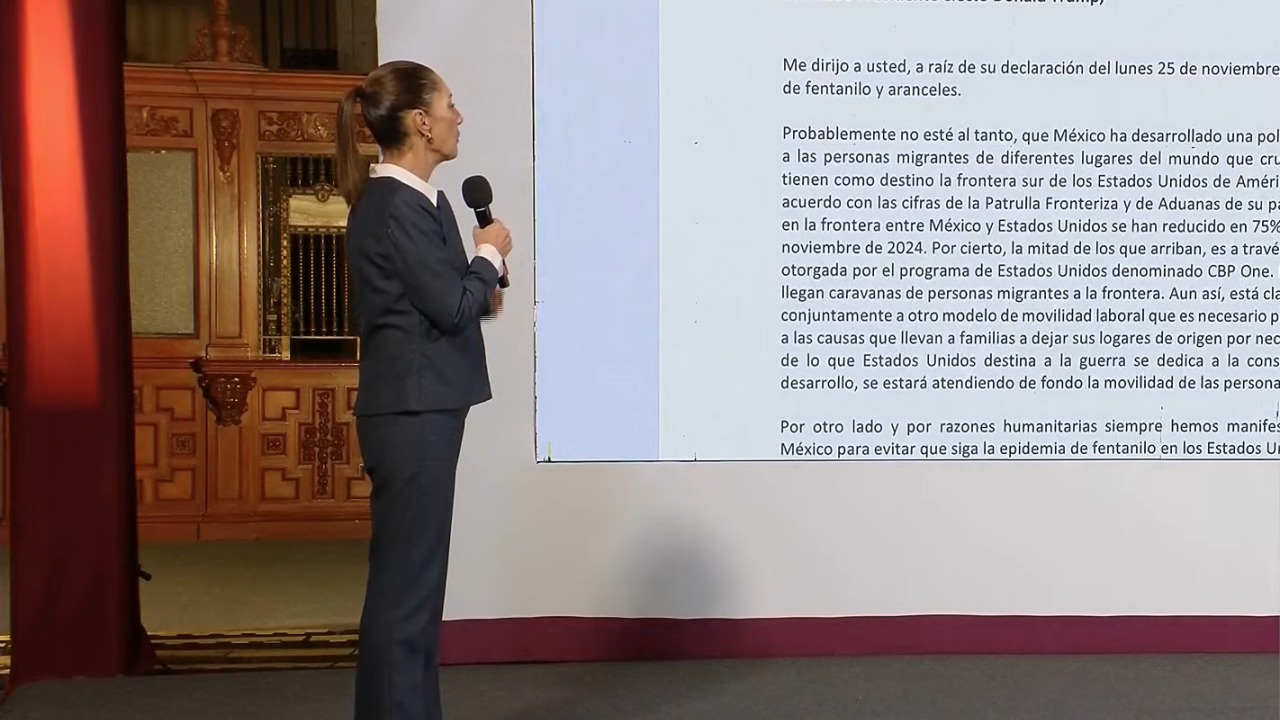
Claudia Sheinbaum rejected the threats of the US president-elect to impose tariffs as a pressure measure and argued that these actions could generate inflation and job losses in both countries.
Mexican President Claudia Sheinbaum responded on Tuesday morning to the announcement by US President-elect Donald Trump of a 25% tariff on Mexico and Canada, scheduled for the start of his next administration.
Sheinbaum Pardo released a letter that she will send to Donald Trump today, in her usual "La Mañanera del Pueblo" conference, in which she reiterated the importance of cooperation and mutual understanding to face challenges regarding migration and fentanyl trafficking.
The head of the federal executive rejected Trump's threats to impose tariffs as a pressure measure and argued that these actions could generate inflation and job losses in both countries.
“It is not with threats or tariffs that we will address the migration phenomenon, nor drug consumption in the United States. Cooperation and mutual understanding are required in the face of these great challenges. Even with the tariff, another will come in response and so on until we put common enterprises at risk,” the president read.
Reading the letter, the president highlighted Mexico's achievements in migration matters, emphasizing that comprehensive migrant care policies have reduced encounters at the border between the two countries by 75% from December 2023 to November 2024, according to figures from the United States Customs and Border Protection Office (CBP).
“Incidentally, half of those who arrive do so through a legally granted appointment through the United States program called “CP One” for these reasons caravans of migrants no longer arrive at the border, even so it is clear that we must jointly arrive at another model of labor mobility that is necessary for their country and attention to the causes that lead families to leave their places of origin out of necessity,” he said.
Regarding the fight against fentanyl trafficking, Sheinbaum acknowledged the efforts made by the Mexican armed forces and prosecutors, which this year have seized tons of drugs, confiscated more than 10,340 weapons and arrested 15,640 people related to drug trafficking crimes.
He also reported on a constitutional reform in the process of being approved to declare the production, distribution and sale of fentanyl and other synthetic drugs a serious crime.
The Mexican president said that in the matter of fentanyl trafficking, “the United States consumes the drugs, but Mexico provides the deaths.”
However, he stressed the need for a joint strategy that includes international collaboration to control the illegal entry of chemical precursors from Asia, which also affects the United States and Canada.
Trump said Monday he would impose massive tariffs on America's three largest trading partners — Canada, Mexico and China — and outlined how he would implement campaign promises that could spark trade wars.
Trump, who takes office on January 20, 2025, said he would impose a 25% tariff on imports from Canada and Mexico until they clamp down on drugs, particularly fentanyl, and migrants crossing the border, a move that would appear to violate the USMCA free trade agreement.
"On January 20th, as one of my many first Executive Orders, I will be signing all necessary documents to charge Mexico and Canada a 25% tariff on ALL goods entering the United States and its ridiculous open borders," Trump wrote in a post on his social network Truth Social.
Trump's announcement caused the dollar to rise. It rose 1% against the Canadian dollar and 2% against the Mexican peso.
A LETTER TO TRUDEAU
On the other hand, Sheinbaum announced that she will send a letter to the Prime Minister of Canada on Tuesday, Justin Trudeau, to highlight Mexico's trade progress and the importance of the United States-Mexico-Canada Agreement (USMCA).
“There is very little information, and it is important to know that, in 2023, among many other data, Canadian imports of electric vehicles of Chinese origin reached US$ 1.6 billion, showing exponential growth. In the case of Mexico, it is much lower, while foreign direct investment from 2006 to 2024 from the United States and Canada has been US$ 33,357 million in the automotive sector in Mexico, that of Chile only US$ 590 million,” said the Mexican president.
On the other hand, the head of the Executive recalled that former President Andrés Manuel López Obrador in August 2023, imposed import tariffs of up to 25% to support national industries.
“On April 23, 2024, (President López Obrador) raised tariffs of between 5 and 50% on manufactured steel and aluminum products from China and other countries that do not have a trade agreement with Mexico; in other words, Mexico has been working in a very important way to strengthen the trade relationship of the treaty or with the countries that we have a treaty with,” he said.
He also emphasized that Mexico is diversifying its trade relations. “We are not only looking north, we are also looking south and also to the European continent, but particularly south with our sister countries, so that is why I tell you that there is a Mexico plan,” he said.










